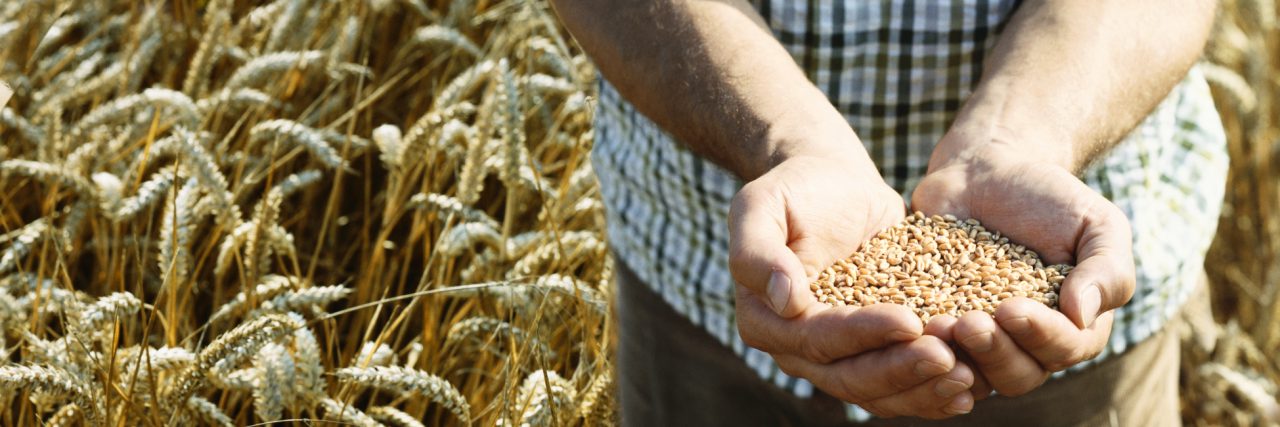


Four new interdisciplinary projects received £1.8 million to improve the sustainability of UK farming.
With a rapidly increasing global population set to reach 9.7 billion by 2050 coupled with environmental change, the challenge of feeding the world has never been greater. Making UK farming more resilient and sustainable will improve the UK’s ability to feed itself, while also benefitting the global food system more broadly.
Funded in the third round of the Sustainable Agriculture Research and Innovation Club (SARIC), the grants have been awarded by BBSRC and NERC, alongside 12 other industry partners. SARIC supports interdisciplinary projects which develop solutions to key challenges affecting the efficiency, productivity, and sustainability of the UK crop and livestock sectors.
The projects include exploring biological management strategies to control insect populations, and investigation of the use of sheep in arable rotations. The funded translational projects include a novel soil health monitoring approach for livestock farming and development of a farmer decision support tool to assist with systemic grassland management.
Aligning with the research priorities laid out in the 25 Year Plan published by the Department for Environment, Farming, and Rural Affairs’ (Defra) in January 2018, these projects will improve the UK’s soil health, and reduce the use of artificial pesticides.
Dr Karen Lewis, BBSRC Executive Director for Innovation and Skills, said: “These four new projects funded through the Sustainable Agriculture Research and Innovation Club will contribute towards developing novel technologies and improving farming practises to increase the sustainability of the UK agricultural sector.”
Dr Lewis continued, “Through joint investment between BBSRC, NERC and ESRC together with the 12 Industry Members of the Club, we are pleased to have awarded £10 million funding into a diverse range of research and research translation projects over the last four years. These projects have focused on the industry-led challenges of developing more resilient and robust crop and livestock systems and building predictive capability and modelling technologies for UK agriculture. SARIC continues to play an important role in fostering academic-industry collaboration to address these important issues for the future of UK farming.”
Professor Tim Wheeler, Director of Research and Innovation at NERC, said: “SARIC’s unique approach to supporting research and innovation projects at the interface of biological, environmental and social science offers a fantastic opportunity to address the industry-led challenges of developing more resilient and robust crop and livestock systems and building predictive capability and modelling technologies for UK agriculture.”
“The four new projects focussing on grassland management, soil health monitoring, biological crop protection and the use of sheep in arable rotations represent the diversity of the sector and of SARIC’s portfolio of funded work. The success of this initiative is testament to the strength of the partnership between the three Councils and SARIC’s 12 industry members, and I look forward to seeing the impacts delivered from this £10 million investment.”
SARIC was launched in 2014 following consultation with trade associations, levy boards, policy makers and academia. The discussions identified a need to bring together researchers from the environmental, biological and social sciences with industry, to translate knowledge for the purpose of progressing towards more sustainable agricultural systems and technological solutions.
Industry partners in SARIC benefit from improved connectivity with the UK research base and early access to research and translation outcomes. This five public-private partnership has resulted in approximately £10 million being invested in academic led research projects to address key industry challenges, with £1 million of this funding resulting from industry partner membership subscriptions.
More information about Sustainable Agriculture Research and Innovation Club (SARIC).
The funded research projects are:
SARIC-funded research grants
| Principal investigator | Organisation | Title | Value |
|---|---|---|---|
| David Chandler | The University of Warwick | Biological crop protection: a new 'slow down/speed up' strategy for aphid management | £598,696 |
| Jonathan Leake | The University of Sheffield | Restoring soil quality through re-integration of leys and sheep into arable rotations | £755,670 |
The translational research projects will establish new collaborations to tackle the challenges of sustainable intensification in agriculture and are:
SARIC-funded research translation grants
| Principal investigator | Organisation | Title | Value |
|---|---|---|---|
| Davey Jones | Bangor University | Breaking the Barriers to Soil Testing on Pastures (Breaking-STEP) | £226,410 |
| Paul Burgess | Cranfield University | SARIC Translation: Grassland Management | £199,878 |
ENDS
About BBSRC
The Biotechnology and Biological Sciences Research Council (BBSRC) is part of UK Research and Innovation, a non-departmental public body funded by a grant-in-aid from the UK government.
BBSRC invests in world-class bioscience research and training on behalf of the UK public. Our aim is to further scientific knowledge, to promote economic growth, wealth and job creation and to improve quality of life in the UK and beyond.
Funded by government, BBSRC invested £469 million in world-class bioscience in 2016-17. We support research and training in universities and strategically funded institutes. BBSRC research and the people we fund are helping society to meet major challenges, including food security, green energy and healthier, longer lives. Our investments underpin important UK economic sectors, such as farming, food, industrial biotechnology and pharmaceuticals.
More information about UK Research and Innovation.
More information about BBSRC, our science and our impact.
More information about BBSRC strategically funded institutes.


